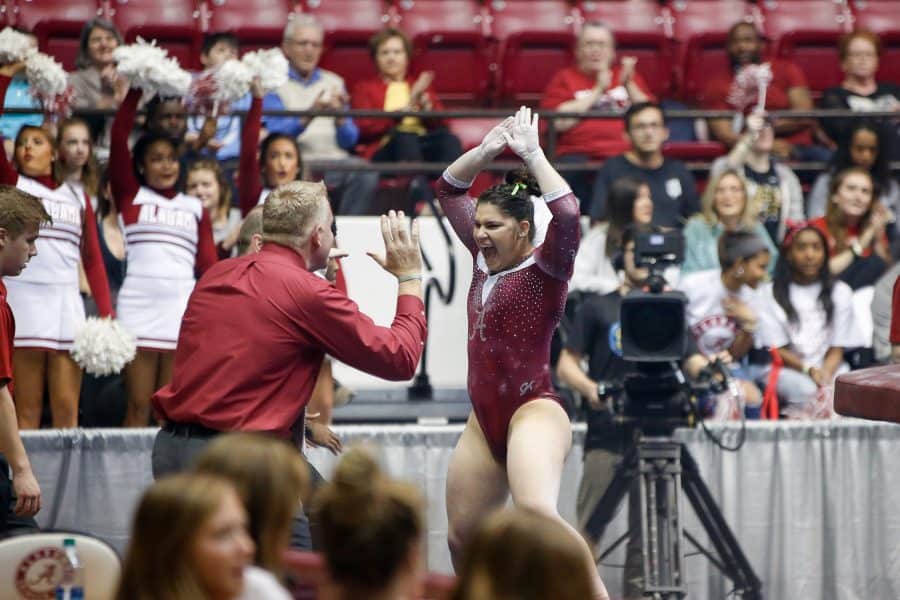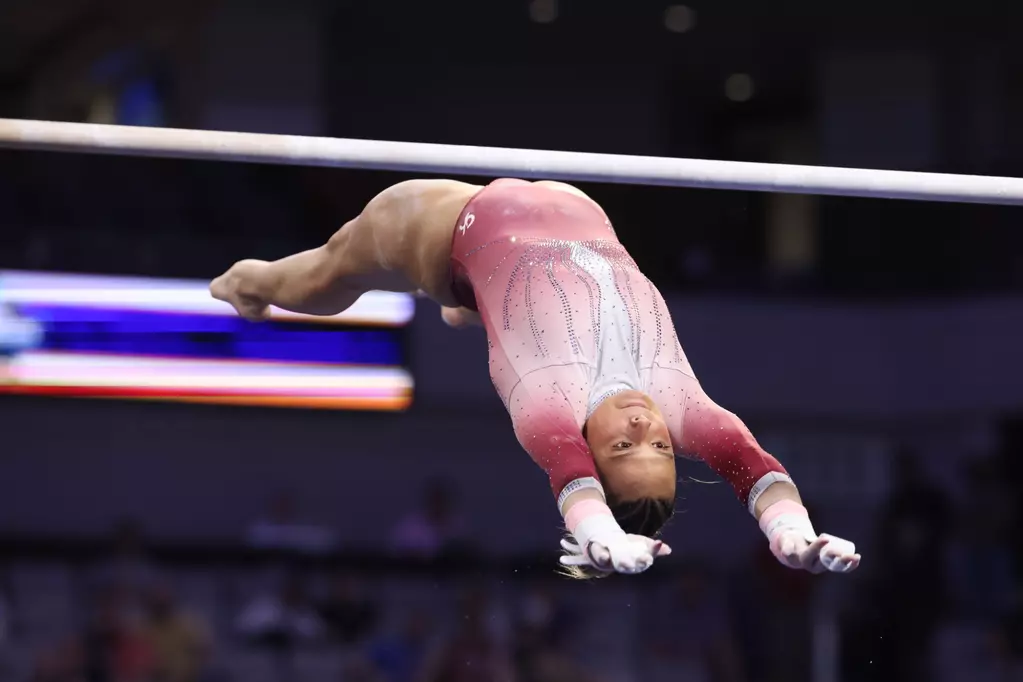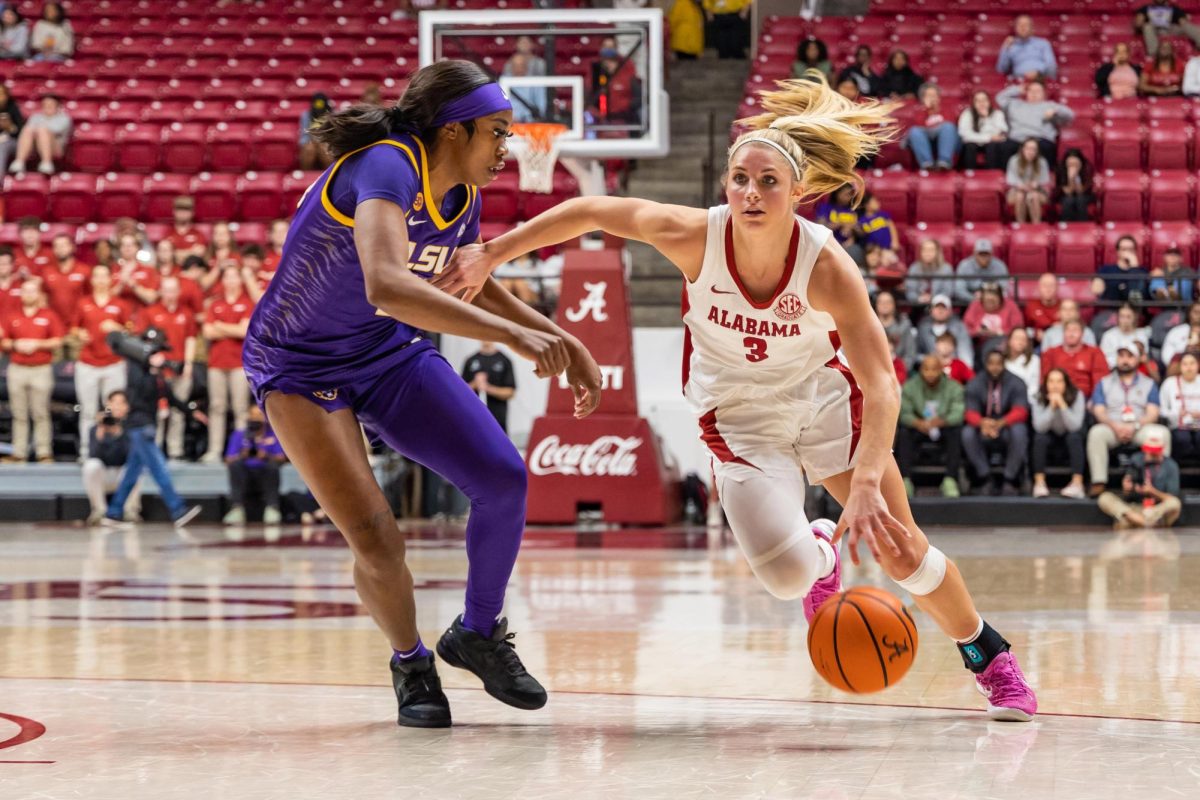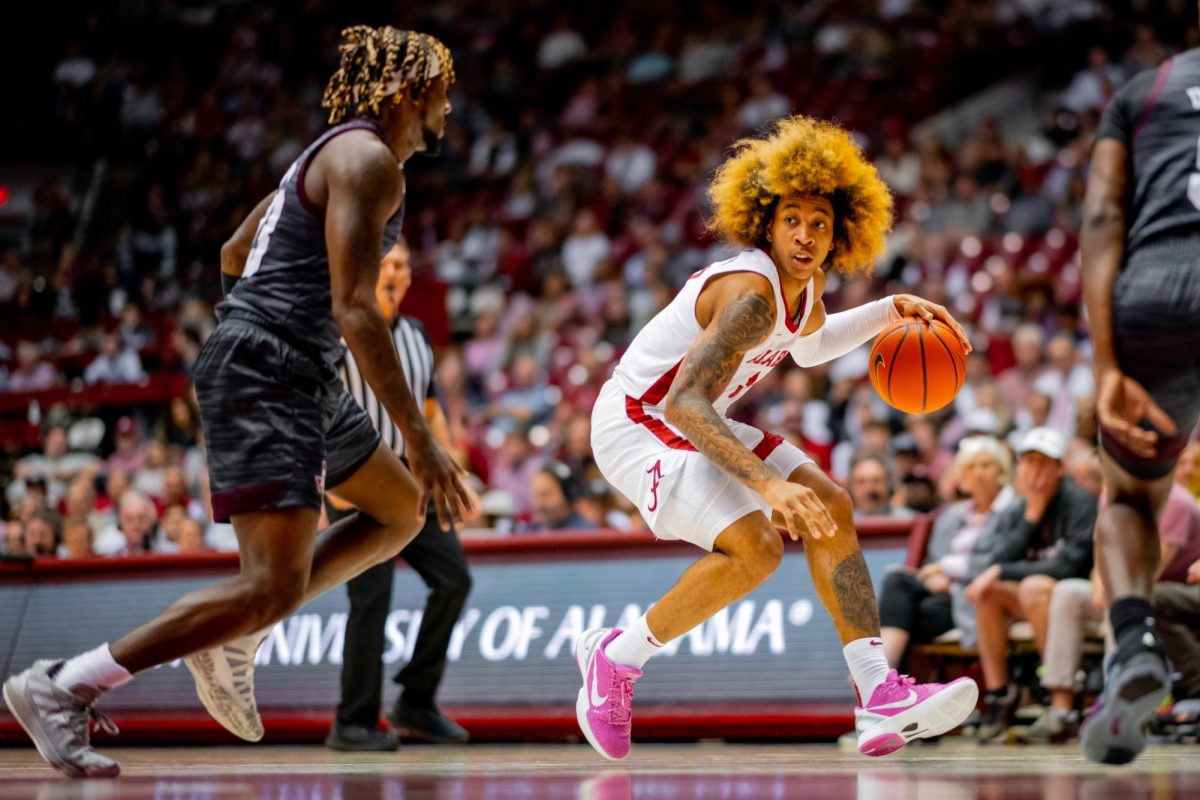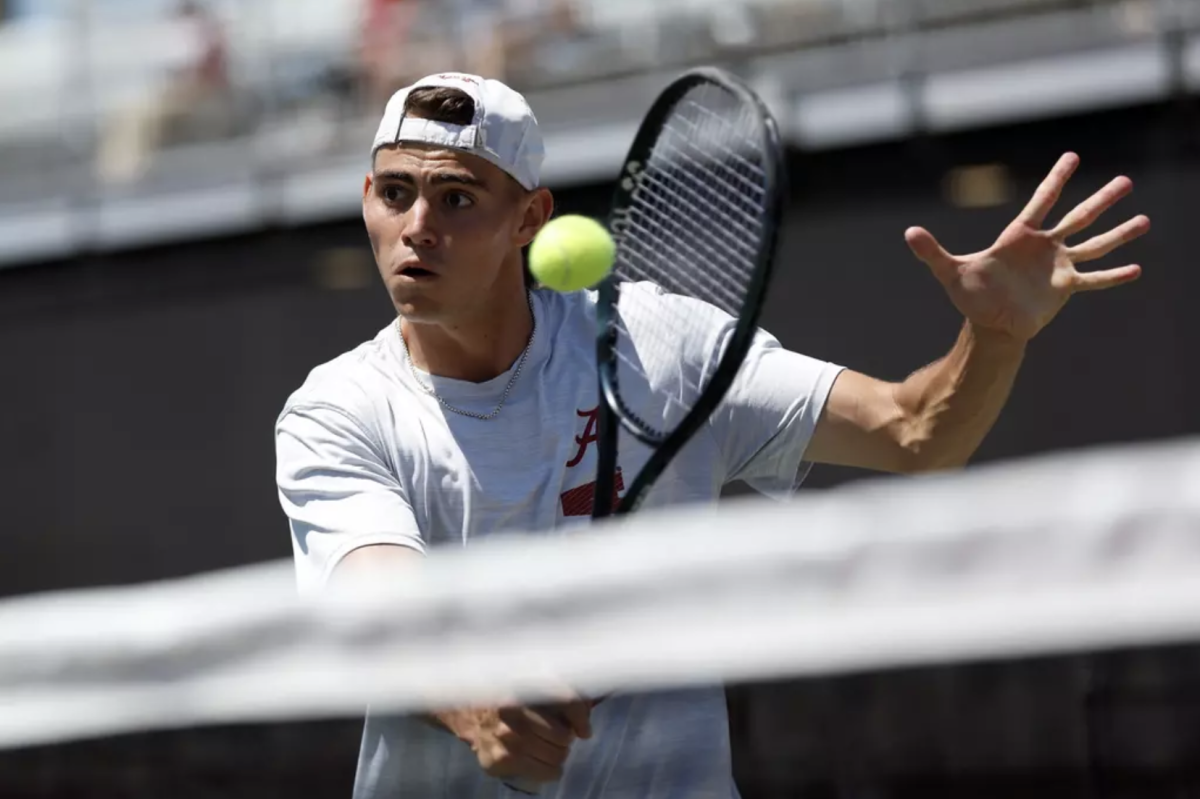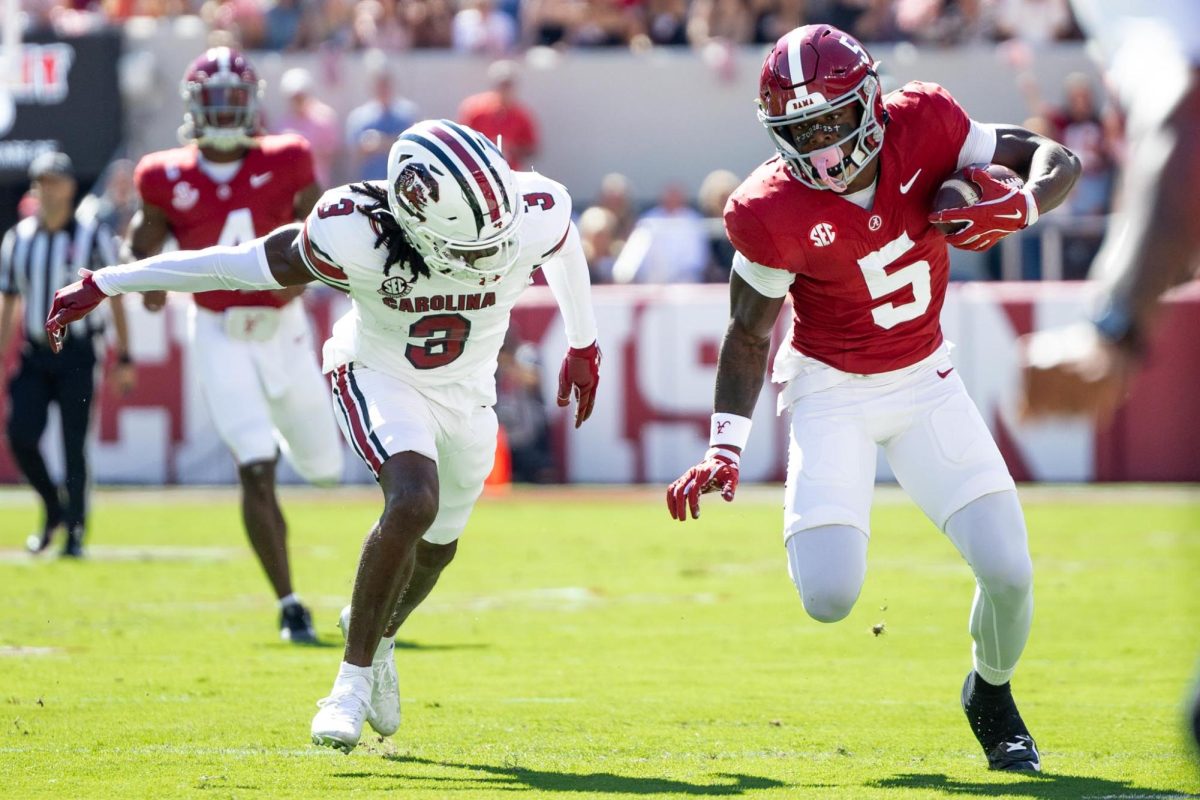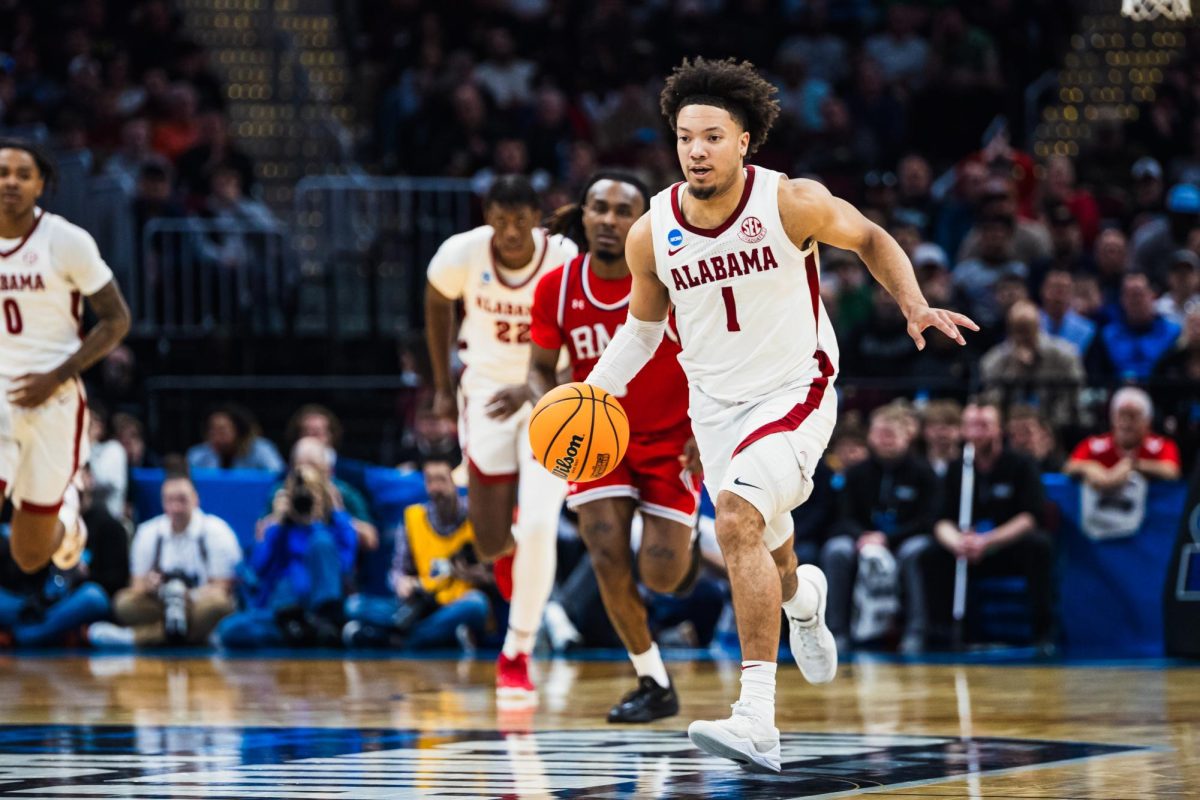After her name was called over the Chaifetz Arena loudspeaker, junior Ari Guerra strode forward to the main stage, where she received a bouquet of white flowers tied together with blue and gold ribbon. Guerra had just claimed first place on floor exercise at the SEC gymnastics championships in St. Louis, Missouri, sharing the title with two gymnasts from separate schools.
The customary bouquet of flowers given to Guerra symbolized her accomplishment, but she did not hold on to them for very long.
Once the award ceremony concluded, Guerra sought out and found senior Florida gymnast Kennedy Baker, who was a teammate of Guerra’s prior to their collegiate careers. About a month earlier, Baker had suffered the same devastating, career-ending injury as Alabama gymnast Mack Brannan: a ruptured Achilles.
One of the best floor performers in the country, if Baker had been healthy, she would have almost certainly been in contention to win floor at the SEC Championships. Knowing that, Guerra honored Baker by giving her the bouquet.
“I was like ‘Kennedy, I want to come up to you because I know you would’ve rocked floor and you probably would’ve won,’” Guerra said. “So I gave her my flowers.”
Guerra’s familiarity with career-altering injuries must also have played a part in her act of kindness.
Before she came to join coach Dana Duckworth’s squad at Alabama three years ago, Guerra herself encountered an injury that put her gymnastics future in jeopardy.
Poised to join the U.S. National Team for training in Huntsville, Texas, Guerra, a League City, Texas native, instead made the difficult decision to undergo surgery on her back. Over time as an elite gymnast, Guerra had sustained four breaks in her lower back: two in her L4 and two in her L3 spinal regions. Although she wanted to give the national team her best shot, the nearly unbearable pain needed to be remedied.
The surgery, conducted by Fort Worth, Texas based doctor Mark Wylie, would require four screws to be placed in Guerra’s back, a nightmare scenario for any gymnast.
“I remember I didn’t know what to expect going into it,” Guerra said. “I didn’t have anybody to look to when I was coming back because I had never met anybody who has had this back injury and still does gymnastics.”
When the surgery was successfully completed, the long, tumultuous road to recovery began. With a bulky brace strapped around her back and a walker as her only source of mobility, Guerra was less focused on getting back to gymnastics and more concerned with regaining the ability to walk normally.
“I would say the recovery process was very emotional,” Guerra said. “It was very up and down. There was a lot of times when I didn’t think I’d get to where I was now. I couldn’t walk for a while.”
Recovery was an uphill battle from the start, but eventually Guerra abandoned the walker and returned to the gym, at first focusing solely on conditioning before slowly mixing in some actual gymnastics. Throughout her rehabilitation and return to gymnastics, Guerra leaned heavily on her faith.
“If I did not have a strong foundation in [God], I don’t think I would be able to make it as far as I did in gymnastics,” Guerra said.
It was not until Guerra was a freshman at Alabama that she was able to perform a floor routine again, a monumental moment that was emotional for all involved.
“First time she did a floor routine was two years after her back surgery,” Duckworth said. “I cried like a baby.”
In her floor debut as a freshman for the Crimson Tide, Guerra earned a remarkable 9.9. Although that moment felt like the apex of Guerra’s comeback, she was just getting started.
As a sophomore, Guerra competed in the Crimson Tide’s floor lineup 12 times and tied her career-best of 9.9 while also contributing on uneven bars. This season, Guerra has continued to compete regularly on both floor and bars, but has also added vault back into her repertoire.
“To have Ari back on vault and to contribute, it’s been a huge thing for Alabama,” senior Kiana Winston said. “We are putting more and more consistent vaults up and I think the uniqueness of her vault provides us with more flavor and it just says ‘oh, that’s how Alabama’s different on vault.’”
The “flavor” that Winston is referring to comes from Guerra’s one-of-a-kind vault technique, which is more a product of necessity than an attempt to create a unique style. The vault, engineered by assistant coach Bill Lorenz, features uncommon movements that minimize stress on Guerra’s back. Nonetheless, Guerra’s vault still maintains a 10.0 start value and has injected a needed boost in Alabama’s lineup.
“That’s a 10.0 vault and for Ari to do it her third year after not vaulting for so long is even more awe-inspiring and motivating to the team,” senior Nickie Guerrero said. “We really needed it, and she came in clutch.”
Since competing on vault for the first time against Arkansas early this season, Guerra’s score on the event has steadily improved, culminating in a 9.9 at the SEC Championships.
“When she did that vault [against Arkansas], I didn’t have tears,” Duckworth said. “I had such happiness that she beat the odds. She has four screws in her back.”
As Guerra continues to put it together in the gym, she is beginning to figure out her future after college gymnastics as well. With a little help from Wylie, the man that made her comeback possible, Guerra has realized her desire to follow in his footsteps and enter the medical field. Her sights are set on medical school, with an offer already on the table from Wylie to shadow him.
“He’s probably one of the main reasons I have continued to go down the medical field,” Guerra said. “I saw him last year after season, and he re-encouraged me to kind of continue that journey just because that is something that I’ve wanted to do for so long and he doesn’t want me to see that kind of slip out of my hands.”
Looking back on her journey, from where she was – unable to walk, her gymnastics career in peril – to where she is now – an SEC Champion on floor with a promising medical career in front of her – she asserts that she would not change a thing.
“The four years have definitely been a lot, but it’s been worth it,” Guerra said.



